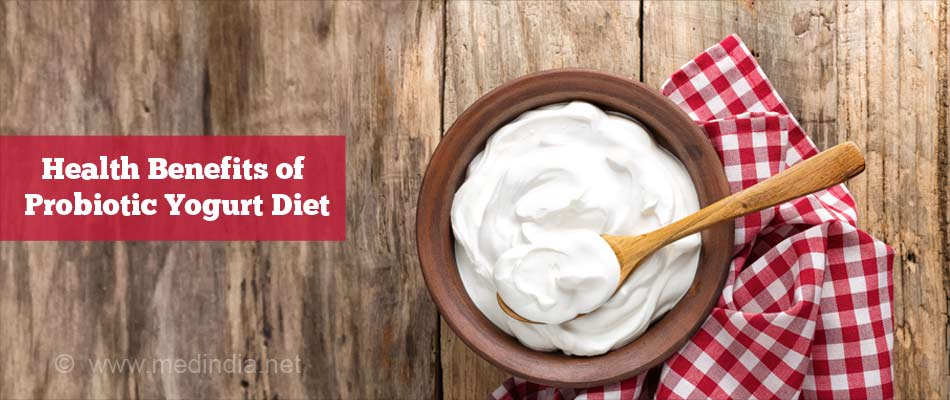- Kechagia, M. et al “Health Benefits of Probiotics: A review” ISRN Nutrition, 2013.
- Milind, P. et al “Curd: A sedative with a bonus bowl of useful side effects” International Research Journal of Pharmacy, 2014.
- Ahluwalia, S. & Kumar, P. “Physiochemical and sensory properties of mango soy fortified probiotic yogurt” Journal of Food Processing & Technology, 2013.
- Ejtahed, H.S. et al “Effect of probiotic yoghurt containing Lactobacillus acidophilus and Bifidobacterium lactison lipid profile in individuals with type 2 diabetes mellitus” Journal of Dairy Science, 2011.
- Kadooka, Y. et al “Regulation of abdominal obesity by probiotics in adults with obese tendencies in a randomized control trial” European Journal of Clinical Nutrition, 2010.
- Rizzardini, G. et al “Evaluation of the immune benefits of two probiotic strains” British Journal of Nutrition, 2012.
- Sharma, S et al. "Probiotics in India, Current Status and Future Perspectives" PharmAspire: 4 Oct. 2013
What Are Probiotics?
The term probiotic refers to dietary/probiotic supplements (tablets, capsules, powders, lozenges and gums) and probiotic foods (fermented milk, cheese, ice cream, buttermilk, milk powder, and yogurt) that contain “beneficial” or “friendly” bacteria. It is claimed that probiotics (meaning “for life,” as opposed to antibiotics) confer health benefits primarily by rebalancing the normal microflora in the large intestine. The beneficial effect is exerted by the microorganisms when consumed in adequate amounts as part of food or a supplement.
According to Food and Agriculture Organization, probiotics are defined as “live microorganisms which when administered in adequate amounts confer a health benefit on the host.”

There are many general types of bacteria (common ones are Lactobacillus and Bifidobacterium), which are used as probiotics. They are promoted to improve digestion, strengthen immunity, aid weight loss, protect against periodontal disease and improve general health.
Probiotics in Yogurt
Curd/yogurt is a semi-solid food commonly consumed in most households across the world. Milk gets converted to curd/yogurt by lactic acid fermentation. The good quality curd is sweet to taste and has a pleasant aroma. A daily bowl of fresh curd helps to prevent numerous diseases and is nutritionally very adequate. It can be viewed as a “natural probiotic”.
For more specific disease preventive benefits, a range of food products containing specific probiotic strains has been developed. Food companies are manufacturing products that meet consumers demands for a healthy lifestyle. These foods are aimed to prevent nutrition related diseases and promote physical and mental wellbeing. They come under the category of functional foods. One of the most promising areas in functional foods lies in the modification of gastrointestinal tract activity by the use of probiotics.
Probiotic yogurt is one of the most widely used probiotic food. It provides probiotic health benefits and is extremely rich in protein, calcium and B vitamins. It increases the number of beneficial microflora in the intestinal tract and facilitates direct consumption of live bacteria.
Commercial yogurts are prepared by fermentation of milk with bacterial cultures consisting of a mixture Streptococcus thermophilus (ST), Lactobacillus delbrueckii ssp. bulgaricus (LB).
Although this microflora (Streptococcus thermophilus and Lactobacillus delbrueckii ssp. bulgaricus) is valuable for humans, emphasis has beenplaced on developing yogurt containing probiotic cultures namely Lactobacillus acidophilus (LA) and Bifidobacterium bifidus (BB) for obtaining therapeutic benefits. The mminimum level of probiotics in yogurt suggested is 105-l06 viable cells per gram of product.
Probiotic food products entered the Indian market six years back. Recently The Indian Council of Medical Research (“ICMR”), the apex body for the formulation, coordination and promotion of biomedical research, along with the Department of Biotechnology of the Ministry of Science and Technology have proposed ‘Guidelines for Evaluation of Probiotics in Food in India, which articulates the base for the law to govern probiotics.
These guidelines have described a set of parameters to define a product/ strain as actual probiotic. The guidelines deal with the use of probiotics in food and provide requirements for assessment of safety, health claims and labeling of probiotic strains which would be helpful to the consumers to safeguard their own interest.
In the U.S “The National Yogurt Association” based in the Washington, D.C. area, is dedicated to advancing the interests of the live and active culture yogurt industry, as well as helping consumers understand the healthful attributes associated with consumption of live and active culture yogurt. The Live & Active Culture seal, which appears on refrigerated and frozen yogurt containers (voluntary), is the best indicator of their presence at the time of manufacture.
The microflora should be alive to an adequate number to exert their positive effect on the host. This attribute is known as “viability”. Survival of these bacteria during storage and until consumption is therefore an important aspect.
Probiotic yogurt is widely available in the market as plain yogurt, low-fat yogurt, and flavored yogurt under different brands.
Health Benefits of Probiotic Yogurt
There is increasing evidence for the claims made regarding beneficial effects of probiotics, such as improvement of intestinal health, enhancement of the immune response, reduction of serum cholesterol. Probiotics have various mechanisms of action although the exact manner in which they exert their effects is still not fully elucidated. These range from bacteriocin and short chain fatty acid production, lowering of gut pH, stimulation of mucosal barrier function and immunomodulation.
Gut Health:
Probiotics play a vital role in reducing diarrhea, especially some kinds of infectious diarrhea and diarrhea associated with antibiotic use. Studies suggest that certain probiotic strains help in mild to moderate ulcerative colitis (a type of inflammatory bowel disease) and possibly reduce bloating and gas in irritable bowel syndrome (IBS). If one suffers from mild to moderate ulcerative colitis or IBS, consumption of probiotic yogurt may be a helpful adjunct treatment. Certain strains of B. lactis and L. casei have also been found to improve stool consistency and frequency of bowel movements in people with constipation. Study published in Nutrition Journal evaluates the role of probiotics in treating constipation in pregnant women
One product that has some research behind it in the management of ulcerative colitis and irritable bowel syndrome is VSL#3, a high potency probiotic medical food and a combination of eight different probiotic strains. It claims to deliver the highest available concentration of live beneficial bacteria than any other probiotic.

Weight Loss and Cholesterol Reduction
A study in the European Journal of Clinical Nutrition in 2011 found that people who drank fermented milk with a particular strain of Lactobacillus gasseri for 12 weeks experienced a reduction in abdominal fat and body weight, compared to those consuming a control drink.
Another study published in the Journal of Dairy Science tested the effect of probiotic yogurt on the lipid profile of individuals with type 2 diabetes. Probiotic yogurt was found to improve total cholesterol and LDL cholesterol in type 2 diabetic people.
Despite the above findings, relationship between weight loss and probiotic consumption remains weak as opposed to the claims made by probiotic manufacturers.
Boosts Immune System
Friendly bacteria in the colon help boost immune system —and probiotics have been linked to enhanced immune responses (such as to flu vaccines). A study published in 2012 in the British Journal of Nutrition, found that certain probiotic strains boosted measures of immune response. Whether taking probiotics will actually curb colds and other upper respiratory infections have yet not been proved.

Oral Health
In addition to the microflora present in the colon, bacteria populate in the mouth as well. An increasing number of probiotics are thus being promoted for better oral health—for example, to reduce periodontal disease, throat infections and bad breath. Studies show that certain strains may have some benefits, but commercial products may not contain the same strains and formulations. Thus, probiotic not containing the tested strain may not exert any oral health benefits.
Other Benefits
Probiotics have been claimed to lower blood pressure, alleviate skin conditions like eczema, treat ulcers and urinary tract infections, prevent colon cancer, and ease anxiety and depression. A lactose intolerant individual would probably have less of a problem with yogurt than milk because the live bacteria digest some of the lactose (milk sugar).

Side Effects of Probiotics
Probiotics are considered safe overall but short-term side effects may include gas and bloating. They may overstimulate the immune system or adversely affect metabolic pathways such as carbohydrate metabolism. If an individual is immune-compromised, have certain bowel problems or is seriously ill in other ways, probiotics should be used cautiously.
Probiotics are a promising field of research. One day they may be used to treat or prevent many disorders. But currently there is lack of enough evidence, regarding its clinical benefits.
Probiotics are regulated as foods and don’t undergo rigorous testing and approval that medicines do.
We don’t know whether probiotic yogurts, drinks, supplements, or tablets contain what is stated on the label. (Time to time testing of probiotic supplements, foods and drinks has shown that they contain far less number of beneficial bacteria contrary to claims made on the label.)
Whether the friendly bacteria are alive and present in the quantum stated on the label as heat treatment leads to their destruction.
Whether the number of good bacteria added to the probiotic is enough to have a beneficial effect.
It’s also worth noting that the different probiotic strains have completely different effects on the body. So their curative property cannot be generalized.
Further research is needed in the field to make obvious health-related claims and promote extensive usage of probiotic yogurt.
Health tip:
When on a course of antibiotics, add probiotic foods or supplements to the diet to help restore good bacteria which are otherwise killed.





